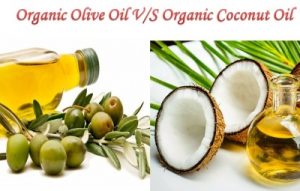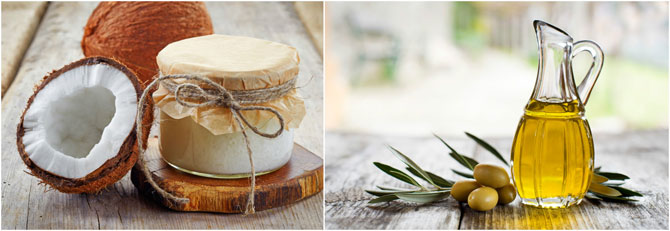Coconut Oil vs Olive Oil
Coconut oil, the exotic oil has been receiving a lot of attention in the last years and has grown in popularity because of its potential beneficial effects on energy, atherosclerosis, and aging.
These benefits are attributed to coconut oil’s high medium chain triglyceride (MCT’s) content, which are fatty acids that are more easily used as energy by our bodies rather than stored fat, and therefore help regulate insulin triggers. Coconut oil is also very high in the saturated fatty acids.
Because coconut oil has been receiving so much attention, olive oil has fallen slightly to the wayside, even though it long held the title as the ultimate healthy oil.
This brings up the question – Which is better?
Well that depends…..
First of all, to some extent oil is oil. All oils are almost entirely comprised of fat (a combination of saturated, mono and polyunsaturated fats) and contain about the same number of calories. Where coconut oil and olive oil differ is in the types of fat they’re comprised of.
Coconut oil is predominantly saturated fat (91%) and its remaining 9% is comprised of polyunsaturated fats (6%) and monounsaturated fats (3%).
Olive oil, on the other hand, is primarily monounsaturated fats (72%), with polyunsaturated fats and saturated fats evenly sharing the remaining 28%.
It’s because of their different composition of fats that these oils have such different health benefits, smoking points, and optimal cooking uses.
Why is the Saturated Fat in Coconut Oil Healthy?
The idea that saturated fat is entirely unhealthy is somewhat misleading and doesn’t give the whole picture. Lauric acid and medium-chain triglycerides (MCTs), the saturated fats that are specifically in coconut oil, fall into the healthy spectrum.
MCTs are a type of fat that our bodies can use immediately for fuel rather than converting them into fat tissue. The MCTs in coconut oil are also known to decrease LDL blood levels while potentially raising HDL blood levels.
Lauric Acid comprises 50% of the saturated fats in coconut oil, and is extremely beneficial for the immune system. It has been found to have considerable antiviral and anti-fungal properties thus making it a great food for digestive health.
It’s also a good source of vitamins E and K, although both vitamin potencies are known to be around 100 times greater in olive oil.
Why is the Monounsaturated Fat in Olive Oil Healthy?
That brings us to olive oil. Whereas lauric acid and MCTs are what make coconut oil great, monounsaturated fatty acids (MUFAs) drive the health benefits of olive oil.
The MUFAs in olive oil help decrease the prevalence of LDL in our blood as well, but have also been found to protect against cardiovascular disease (a benefit not associated with coconut oil’s MCTs). MUFAs also have potent anti-inflammatory properties through numerous biological mechanisms. If you pair olive oil with turmeric, you have an even more potent anti-inflammatory recipe.
Which Oil is Best For Cooking?
They key to determining which oil is best for cooking comes down to its smoking point.
Why is this important? Once an oil reaches its smoking point it starts to burn, which results in a major loss of the beneficial properties normally provided by the oil. Additionally, burnt oil produces free radicals, which studies show are carcinogenic (can cause cancer cell development) and are harmful in a dozen other ways.
Interestingly, because of its saturated fat content, the smoking point of coconut oil is much higher than that of olive oil. Therefore, if you’re looking to prepare food at a high temperature (for example, frying, sauteing, baking, etc.) then you are better off using coconut oil. Olive oil is best used for dressing a dish, emulsifying, mixing, light cooking, etc.
Which Oil is Best Overall?
These two oils constantly battle it out for the “healthiest oil” award. In the end, both should have a place in your pantry. Aim for variety! Choose which oil to use based on how you plan to cook or prepare. You’ll get the health benefits of both oils while adding variety to the flavor of your cooking.
